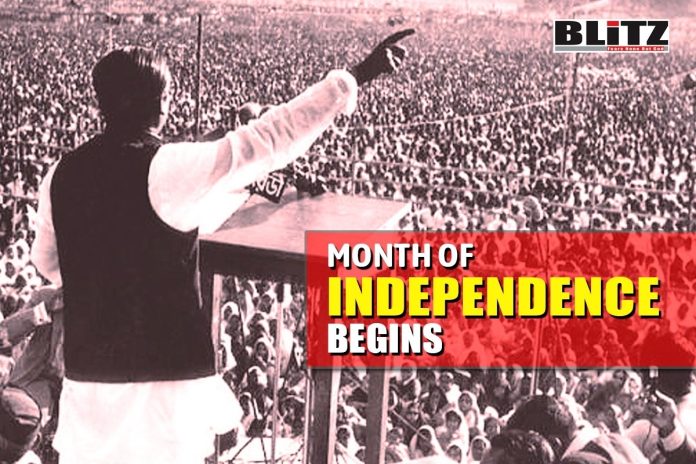Today heralds the start of the month of independence, casting a somber shadow as it evokes memories of the harrowing genocide inflicted by Pakistani occupation forces from March to mid-December in 1971. This solemn occasion serves as a poignant reminder of the immense suffering endured by the Bangladeshi people during that dark chapter.
March holds immense significance in the history of Bangladesh as it marks the historic declaration of independence by the Father of the Nation, Bangabandhu Sheikh Mujibur Rahman, in the early hours of March 26, 1971. This momentous event symbolizes the dawn of a new era and the beginning of Bangladesh’s journey towards sovereignty.
The month also fills the nation with pride due to the historic significance of Bangabandhu’s speech on March 7th, a stirring address that has earned global recognition. Acknowledged by the United Nations Educational, Scientific and Cultural Organization (UNESCO) as a vital component of the world’s documentary heritage, this landmark speech stands as a testament to the enduring legacy of Bangabandhu Sheikh Mujibur Rahman and his pivotal role in Bangladesh’s struggle for independence.
Half a century ago, the nation embarked on its journey towards independence in the month of March, under the steadfast leadership of Bangabandhu Sheikh Mujibur Rahman. After nine months of relentless struggle against the oppressive Pakistani occupation forces, Bangladesh emerged triumphant, securing its sovereignty on December 16, 1971. This momentous achievement stands as a testament to the unwavering determination and resilience of the Bangladeshi people in their quest for freedom.
March is etched into the annals of Bangladesh’s history as a month of profound significance, embodying both sorrow and resilience in the pursuit of freedom. The trajectory towards independence gained momentum from the outset of March 1971, marked by the reprehensible actions of the Pakistani dictator who postponed the scheduled March 3 session of the National Assembly. This maneuver was a blatant attempt to stifle the peaceful and legitimate aspirations of the Bangalee populace, igniting a groundswell of discontent and galvanizing the nation towards a unified struggle for liberation. Thus, March became a crucible of grief, inspiration, and unwavering dedication to the cause of emancipation.
As the political situation worsened and calls for freedom from Pakistan’s oppressive rule grew louder, the inaugural version of Bangladesh’s national flag was raised on March 2 at Dhaka University campus by the Dhaka University Central Students’ Union (DUCSU). This symbolic act marked a significant moment in the nation’s journey towards sovereignty and independence.
The movement against the Pakistani rulers’ conspiracy took a dramatic turn on March 7, marking a watershed moment in the long and challenging struggle for Bangalee’s freedom. This date became a milestone in history, symbolizing the resilience and determination of the people in their quest for liberation.
On March 7, 1971, Bangabandhu Sheikh Mujibur Rahman, revered as the architect of independent Bangladesh, delivered an epoch-making speech of independence at the Race Course Maidan, now known as Suhrawardy Udyan in Dhaka. Standing before a million fervent supporters, Bangabandhu’s words resounded with unwavering determination and resolve. “We had spilled blood…we are ready to shed more blood, the people of the country shall be freed, Insha Allah,” he declared unequivocally in his 18-minute extemporaneous address, stirring the hearts of all who listened.
Continuing his impassioned speech, Bangabandhu Sheikh Mujibur Rahman emphasized the gravity of the momentous struggle unfolding before them. “The struggle this time is for our emancipation, the struggle this time is for our independence,” he proclaimed, encapsulating the collective spirit of defiance and resilience that permeated the air. His words served as a rallying cry for freedom, inspiring a nation to unite in its quest for liberation from the shackles of oppression. Bangabandhu’s historic speech on that fateful day galvanized the Bangladeshi people, reinforcing their resolve to fight for their rights and forge a path towards a free and sovereign Bangladesh.
Bangabandhu’s impassioned plea resonated deeply with people from all walks of life, urging them to prepare for armed struggle against the tyranny and exploitation inflicted by the Pakistani military junta. He called upon every citizen to fortify their homes and communities, transforming them into bastions of resistance against oppression.
His electrifying speech had a profound and unifying effect on the populace, igniting a sense of solidarity and determination to liberate their homeland from the clutches of the Pakistani forces. Under Bangabandhu’s visionary leadership, the people of Bangladesh rallied together, united by a common cause and a shared resolve to confront adversity head-on in their quest for freedom.
As unity among the people of all backgrounds solidified in their pursuit of democratic rights, the Pakistani occupation forces perpetrated the infamous ‘Operation Searchlight’ on the unsuspecting Bangalee population during the night of March 25th. This ruthless act of violence aimed to suppress dissent and extinguish the flames of freedom that burned within the hearts of the Bangladeshi people.
In response to the atrocities committed by the Pakistani forces, Bangabandhu Sheikh Mujibur Rahman swiftly proclaimed the independence of the motherland. Instructing the populace to resist the oppressors with unwavering resolve, he rallied them to stand firm and fight until liberation was achieved. Bangabandhu’s decisive declaration galvanized the nation, inspiring a renewed spirit of defiance and determination in the face of adversity.
Under the guidance of Bangabandhu, the courageous people of Bangladesh waged a nine-month-long war with unwavering determination and resilience. Their relentless efforts culminated in the successful liberation of Bangladesh on December 16, 1971. Through bravery and sacrifice, they overcame immense challenges to secure their independence, marking a triumph of the human spirit and a testament to the indomitable will of the Bangladeshi people.




